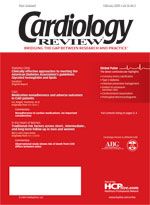Atrial fibrillation: Postsurgical occurrence and drug treatment regimens
Cardiology Review
Apropos of Spring, contains much that is new this month. In our new imaging series, Dr Josh C. Leonard and colleagues offer a selection of images illustrating improved detection of single vessel coronary artery disease in a morbidly obese woman after stress echocardiography failed to provide sufficient diagnostic information. Please turn to this feature
for more details if you wish to contribute an imaging case. In the diabetes section, we have a contribution from Dr P. Michael Ho and associates concerning patients with diabetes who are noncompliant with taking prescribed medications. The authors found that medication nonadherence is not only too common but, as one might expect, is associated with adverse outcomes. What to do about this problem is addressed by one of our new Consultant Board members, Dr Kathleen Wyne, in an inaugural commentary for Cardiology Review. In a combined article in the diabetes and lipids sections, Heidi T. May and Dr Joseph B. Muhlestein determined the effect of statin-fibrate combination therapy on inflammatory biomarkers in 300 diabetic patients with hyperlipidemia. Their results showed that the serum levels of the markers could be reduced by these drugs alone or in combination. The clinical implications of these findings are discussed by another new board member, Dr Sanjay Kaul, in yet another inaugural commentary for Cardiology Review. The arrhythmias section sees Drs Martin Osranek and James B. Seward discuss the problem of atrial fibrillation after cardiac surgery. The authors studied 205 consecutive patients undergoing coronary artery bypass surgery and/or a variety of other cardiac surgical procedures; patients with pre-existing atrial fibrillation were excluded. A positive correlation between preoperative left atrial volume—as determined by echocardiograms—and the occurrence of postoperative atrial fibrillation was obtained. The results of this study are commented on at length by our cardiac surgical consultant, Dr Harold Lazar. Also in the arrhythmias section is a comparison of different drug regimens used to prevent the recurrence of atrial fibrillation. Dr Yuehui Yin and associates worked with a patient population of 177 patients divided into 3 treatment groups. A final inaugural commentary by a new board member—Dr Eric Rashba—provides insights for you, the Cardiology Review reader. To round out the issue, we also have another appearance of our bimonthly feature—preparation questions to help physicians prepare for the Maintenance of Certification Exam in Cardiovascular Disease. Enjoy!
Treatment options for atrial fibrillation in a 62-year-old man
